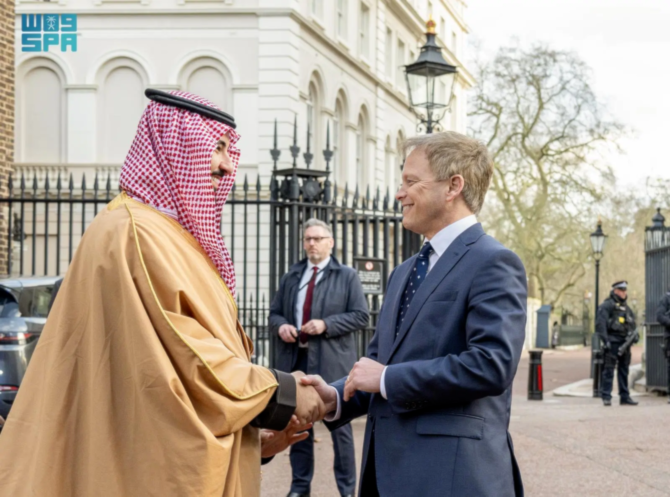UK MoD paid millions into Saudi account amid BAE corruption scandal
According to The Guardian, previously private records show how the MoD decided to send the payments to a Saudi bank account after the transactions were investigated by the UK anti-corruption agency.
-

The UK’s Secretary of State for Defense Grant Shapps welcomed Prince Khalid at a formal reception at Lancaster House in London. (SPA)
Despite worries that the Saudi royal family would pocket the money, Britain's Ministry of Defense transferred problematic payments via its bank account during one of the worst corruption scandals in history.
According to The Guardian, previously private records show how the MoD decided to send the payments to a Saudi bank account after the transactions were investigated by the UK anti-corruption agency, the Serious Fraud Office (SFO).
The report reveals that a senior MoD official did not want to "displease key Saudis" by turning down the Saudi requests for payments, citing the need to “keep the Saudis on our side at this critical time."
As outlined in the documents, the new payment method was established when the SFO began investigating claims that BAE, Britain's largest arms manufacturer, paid substantial payments to the Saudi royal family to secure the controversial UK-Saudi al-Yamamah deal.
The contract called for Britain to supply Saudi Arabia with 120 Tornado aircraft, Hawk fighters, and other military equipment. Dr. Susan Hawley, head of Spotlight on Corruption, said it was "utterly shocking" that the MoD had developed an opaque new structure to permit the continuous flow of payments beyond the conclusion of the SFO investigation.
The MoD stated that the Saudis were in charge of disbursing the payments under the new arrangement. "All such funds remained at all times the property of the Saudi Arabian government," stated a spokeswoman for the Kingdom.
The latest records, published by The Guardian, indicate that the British Ministry of Defense and BAE, the major contractor in the al-Yamamah deal, used a secret method to transmit quarterly payments to Prince Bandar bin Sultan from 1988 to 2007.
Son of Saudi Defense Minister purchases Airbuses funded by MoD
The records contradict British politicians' decades-long statements that there was no wrongdoing in the arrangement reached by Margaret Thatcher's government in the 1980s. Bandar, the son of Prince Sultan, the then-Saudi Defense Minister, was an important figure in the discussions.
"The normal process," according to one of the letters, was for Bandar to write each quarter to the top British official in charge of pushing arms sales "requesting that the next installment be paid." The official would "instruct" another senior MoD official "to take the necessary action, and he, in turn, would task [BAE] to make the payment."
A portion of the money was used to purchase an Airbus A340 worth £75 million for Bandar's personal use.
The MoD stated that the BAE payments to Bandar were done by agreements between the British and Saudi governments and that the Saudis determined how the cash was spent. It went on to argue that claiming the payments were corrupt was "conjecture".
In 2004, the SFO began investigating BAE's suspected global bribery. Bandar allegedly urged that Blair's government halt the investigation, and, in December 2006, then-Attorney General Peter Goldsmith determined that dropping the probe was in Britain's national interest. Blair said he accepted "full responsibility" for the decision.
In June 2007, The Guardian disclosed the existence of the £1 billion payments to Bandar, which the MoD had approved.
According to the new records, a week after the disclosure, Stephen Pollard, a senior MoD officer, stated that continuing the payments to Bandar would be problematic, saying that they best be avoided and describing them as "increasingly anachronistic".
In late June 2007, the US Department of Justice stated that it had begun a corruption investigation into BAE. It would result in a £25 million penalty for the corporation.
A month later, according to the new records, Pollard informed colleagues that the Saudis had sought further money to support Bandar's private jet. He stated that denying the request would displease key Saudis.
By 2008, the new system has been installed. According to Pollard's notes, the Saudis would make monthly payments to a MoD bank account as part of the official procedures for purchasing military equipment from Britain.
Crucially, the MoD would then transfer a part of this money to a second Saudi government account for "non-operational requirements". The payments remained under the scheme until 2011. Later, another government worker drew a schematic to show the setup.
Pollard stated in 2010 that the "difficulty" for the MoD was that "we have no visibility" into what the money was being utilized for.
BAE has previously denied any wrongdoing, claiming that all payments were made with "express approval" from the UK government and were kept strictly discreet.

 5 Min Read
5 Min Read








